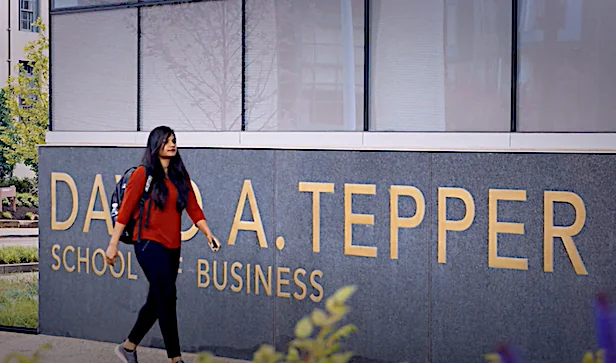
The Tepper School of Business will offer a new, full-time resident MSBA degree beginning fall 2022. Courtesy photo
Tepper School of Business already offers a part-time, online Master’s of Science in Business Analytics (MSBA), mostly to mid-career professionals looking to deepen their analytical skills and move into senior positions. The two-year program boasts an 89% success rate of students either earning a promotion or finding a new job by graduation. They also earned an average of 21% more than their previous salaries.
Now, the Carnegie Mellon school is expanding that program for more recent college graduates. It recently announced a new full-time, in person MSBA that will take nine months to complete. The school is now accepting applications for fall 2022.
“If you’re not yet ready for an MBA, or if you’re interested in an MBA down the road, I think an MSBA positions you very well. It gives you the skills that you can only get from data science as well as the business knowledge to make a real impact in actual business application,” says Willem-Jan van Hoeve, Carnegie Bosch professor of operations research and senior associate dean of education.
DATA SCIENCE + BUSINESS KNOW-HOW
For students looking to work with big data while analyzing complex business problems, Tepper is a top choice. In 2021, Tepper School was ranked No. 2 by U.S. News & World Report for Business Analytics, Information Systems and Production/Operations Management. Meanwhile, demand for data professionals is soaring. The Business-Higher Education Forum predicts that more than 2.7 million jobs are opening to data professionals in the United States, and nearly 40% of data scientist and advanced analyst positions will require an advanced degree.
While the full-time residential degree was developed with more traditional graduate students in mind, mid-career data professionals looking to pivot can also benefit, van Hoeve tells Poets&Quants.
P&Q recently caught up with professor van Hoeve to talk about Tepper’s new full-time MSBA, its four curricular pillars, and why demand for the degree is higher than ever. The interview has been edited for length and clarity. Learn more about the new MSBA here.
Please begin by explaining a bit more about why Tepper created a full-time, in-person MSBA?
We already offer the online MSBA program, which we started a few years ago, and the need since then has only increased for business analytics professionals. GMAC reports that 62% of corporate recruiters plan to hire MSBA graduates in 2021, up from 47% in 2020. We saw similar numbers way back in the day when we started designing the online MSBA as well. So that only corroborates our desire and intent to launch an on-campus version of the program.
How does the curriculum compare for the online and in-person programs?
Our approach to the curriculum is the same as the online MSBA. The target population is slightly different.

Willem-Jan van Hoeve
But it may be good to recognize how we present business analysts and how we prepare our students to become business analytics professionals. On one side of the spectrum you have data sciences, statistics, and so forth. On the other side, you have business professionals. In industry, what you typically find is that people who are trained as data scientists are given a problem that somebody else invents. They work on that problem, they do some analyses and they do some number crunching. On the other hand, there are people who are doing the business side of things, but they don’t necessarily have the acumen or understanding of what goes into the analytics.
What we envision delivering are people who are right in the middle: People who have quite a deep knowledge of the analytic methodologies such as machine learning, operations, research, statistics, optimization and so forth, and they know about data and software engineering, programming, and data visualization to make business cases and actually do some of the analysis themselves. At the same time, they have to translate business applications into data and business analytics problems.
That goes two ways. First, somebody in organizations should identify an opportunity for business analytics, and then match with it the tools and methodologies most suitable for it. Now at that stage, one of our graduates could either do their own implementation, or hand off more detailed questions to another member of the team, possibly an engineer or so forth. Second, once the data is analyzed, the results have to be translated back to the stakeholders. This is critical for success because you can do anything you want with data, but as long as the stakeholders don’t accept your solution, it won’t be implemented.
What we really try to do, from day one, is embed communication, data visualization, while translating that back and forth between business application and the data science behind it. So those are really the four pillars of the program: methodology, software engineering, communication skills, and business application domains.
Was this something recent graduates were asking for, as opposed to the mid-career professionals who were more likely to want an online, part-time program?
The recruiting of students for the online program is clearly different because it is, as you said, typically more experienced people. But, some of them were actually looking for a residential program (when they chose Tepper). This mimics somewhat our online MBA, which is quite successful, as well our hybrid MBA that is highly ranked. It turns out that we actually compete with residential MBA programs in some of our candidates, which is quite interesting. We have seen some candidates for our online MSBA programs that actually considered residential MSBA programs at the same time. This is not, of course, the bulk of the students. But there’s a substantial portion of students that get to know us through our online channels, and they are comparing this to full-time residential programs.
NEXT PAGE: Why corporate recruiters are planning to hire 62% more MSBAs in the coming year.





Questions about this article? Email us or leave a comment below.